
In this article, Meyou talks about the ups and downs of bamboozling your opponent. For three mana or otherwise
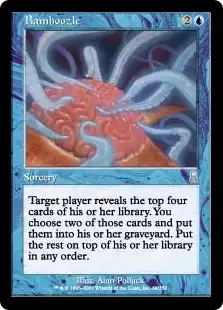
Defining Terminology
So what does it mean to bamboozle in Magic? To bamboozle is to change the way an opponent plays the game passively by presenting a possible or potential scenario. It can be a situation that gives your opponents pause, or one that forces them to deviate from their normal play pattern. For example, they were originally going to play card A first, but the threat on the table forces them to play card B instead. Let’s start simple. I have a Pernicious Deed on the table with eight mana available. Would this change your line of play? It probably would, because whatever hits the table will more than likely get blown up. Your one option is to not cast any permanents. Sure, that could work. What happens if I have a Knight of the Reliquary on the table? Are you just going to sit there while I bash you senselessly? The point is I may not even have to use the Pernicious Deed. This article isn't about what the correct or incorrect play is for a particular situation. It is about the fact that simply facing a Deed changes the way you play. In my book, making an opponent do something they don't want to do is always a great thing.
Let's look at a few more scenarios.
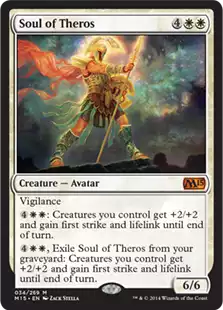
Let's say your opponent has Soul of Theros in the graveyard and is attacking with a 3/3 creature plus six mana available. You have one 4/5 creature. Do you block? If you block, the opponent could active the ability on the Soul of Theros in the graveyard. If you don't block, you will take three or possibly five damage. You decide not to block. Your opponent doesn't activate the ability and you just take three damage. After taking three, your opponent uses the unused mana to cast a spell and passes the turn.
What happened there? What happened is you just got bamboozled.
Scenario
Your opponent is at six life, lands on the battlefield, and an Æther Vial set at three with one card in hand, though it's just another Æther Vial . You have Vendilion Clique on the battlefield, two life, one Island in hand, and some basic lands on the battlefield. Do you attack? They could have nothing. You only need two attacks to win. If you attack, you could win the following turn. If they have Aven Mindcensor, you will be dead. You decide the safe thing is to not attack. The opponent draws and plays Mother of Runes, holding the Æther Vial in hand. You draw a Daze and decide to attack this time. The opponent goes to three and draws a Swords to Plowshares to exile the Vendilion Clique. Mother of Runes dispatches you with five attacks while Counterbalance, Force of Will, and a couple lands off the top do nothing to stop the tiny tyrant. If you would have attacked in that first turn, the opponent wouldn't have had the chance to draw that Swords to Plowshares. They would have been dead, but fear kept your army back.
Scenario
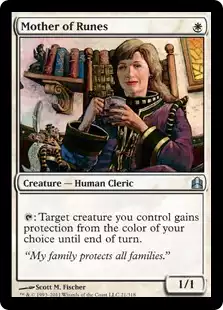
Your opponent got bamboozled. Again, this article isn’t about correct or incorrect plays. It is about bringing attention to these ambiguous situations.
Poker and Bluffing
Isn't this just bluffing? Not always. Let's go back to Mother of Runes. Putting a Mother of Runes on the battlefield isn't bluffing. It is right there. I'm looking you in the face and asking, "What are you going to do about it?" I'm not hiding anything. I'm simply presenting a problem that may change the way you play out your hand.
Let's talk poker a second. I played a lot during college. Nothing competitively, just with some friends for couch cushion money. You know what was the worst aspect of that? I was playing with new players who didn't know how to bluff. If they had a good hand, they played it. If they didn't, they simply folded. The game simply devolved into calculating risk and reward, along with estimating probabilities. I could never bluff those new players. If I tried to bluff, I simply lost to another player’s good hand. There was no game of chicken to be had.
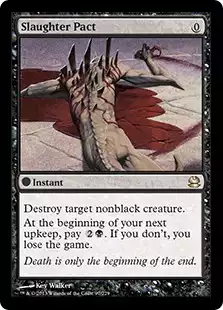
Let’s flip this around. When playing Splinter Twin, I love it when my opponent taps out. It means they have nothing to stop me. I don’t have anything to fear. I know my opponent is simply trying to race. Either they are an idiot and tapping out or they have nothing and are simply hoping I have yet to find my combo pieces. There are only a few scenarios I have to consider. One scenario I need to ask if they have Slaughter Pact in their 75. Other than that, I can just combo off. Don’t look at it as a three mana kill spell. Imagine a metagame where everybody is playing Slaughter Pact and compare it to a metagame where no one is playing the card. How different are those two worlds for the Splinter Twin player?
Poker without bluffing just isn't poker. Magic without bamboozling just isn't Magic.
Learning to Bamboozle
Why is bamboozling important? It opens up opportunities. Mainly, it opens up the possibility for your opponent to make a mistake. Will they always make a mistake? Not always, but those mistakes are free. Those mistakes can often lead to wins that otherwise was an unwinnable situation. Getting bamboozled has only become more evident with the live coverage of Magic competitions. This is because we can see both players' hands. We can see that Player A should just cast a certain card because the opponent has nothing. However, Player A is afraid of something. Maybe it was a counterspell or whatever. They don't know and fear keeps them from casting that game winning spell. All the while you are screaming and shaking your head at your monitor.
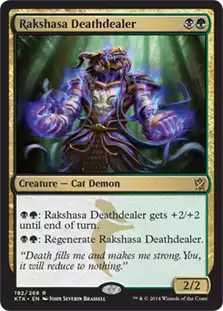
Blue mages have been bamboozling people for decades. Do they have the counterspell or don't they? I remember all too many games of playing chicken with players running Counterspell. To beat the blue mage, the ploy was often to bait out their counterspell or spells in order to play the actual spell you wanted to cast. The other ploy was to cast a spell at the end of their turn. Every non-blue mage got bamboozled. It wasn't because they were presenting a specific threat or board state. However, we all knew the potential in those days. If they dropped an an Island, they were playing a deck full of counterspells. Simply playing an Island was enough to present a possible scenario. Yes, counterspells were powerful, but those mind games often did a number on players. I could have won certain games if I had just jammed my cards, but I lost because I slow-rolled my deck because I was scared. To jam or not to jam, that was the non-blue players question.
Bamboozling Your Deck
This concept came about playing my favorite Commander deck online. No surprise, it was my enchantment deck. I've been playing the deck a lot in order to get a better understanding of enchantments. More and more, I appreciate when Mark Rosewater keeps reiterating that you need to play with the cards to understand the cards. Many players think they can simply theorize in their head everything. You know what? Human beings are not that smart. An unexpected conclusion was bamboozling.
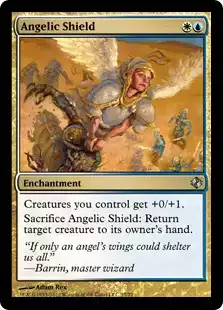
Bamboozling is an aspect that I have grown to appreciate more and more. It is the reason Hushwing Gryff has a warm spot for me. It bamboozles games along with its buddy Rakshasa Deathdealer. Bamboozling isn't always about power level, however. The point here is how these cards are viewed during deck construction. Are the cards in the deck allowing for opportunities? Including cards like Whip of Erobos creates those opportunities. If you don't include those cards in the deck, the deck is devoid of those opportunities. This doesn't mean decks without bamboozled cards lack power or synergy. Bamboozling your opponent is just a different approach to viewing the cards you want to include in your deck.
Professional Play
I'm making a big claim here, but there is a reason I am talking extensively about this topic. It is because bamboozling is what separates the professional from the amateur. Deck building and sideboarding is a skill. Metagaming is a skill. So is bamboozling. Knowing how to manipulate your opponent is the difference between going home after day one of the Grand Prix and making day two. If you are going to play poker professionally, you need to learn how to bluff. If you are going to play Magic professionally, you need to learn how to bamboozle your opponent.
Meyou
-
View User Profile
-
Send Message
Posted Mar 16, 2015-
View User Profile
-
Send Message
Posted Mar 15, 2015-
View User Profile
-
Send Message
Posted Mar 2, 2015-
View User Profile
-
Send Message
Posted Feb 19, 2015